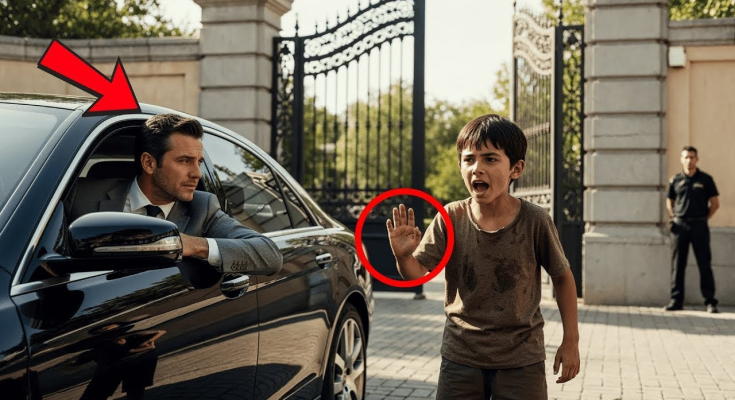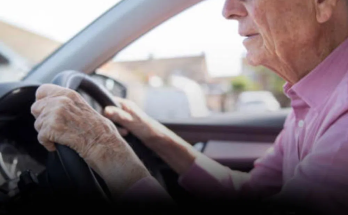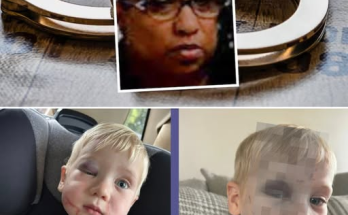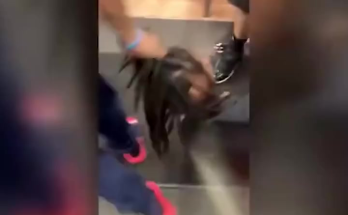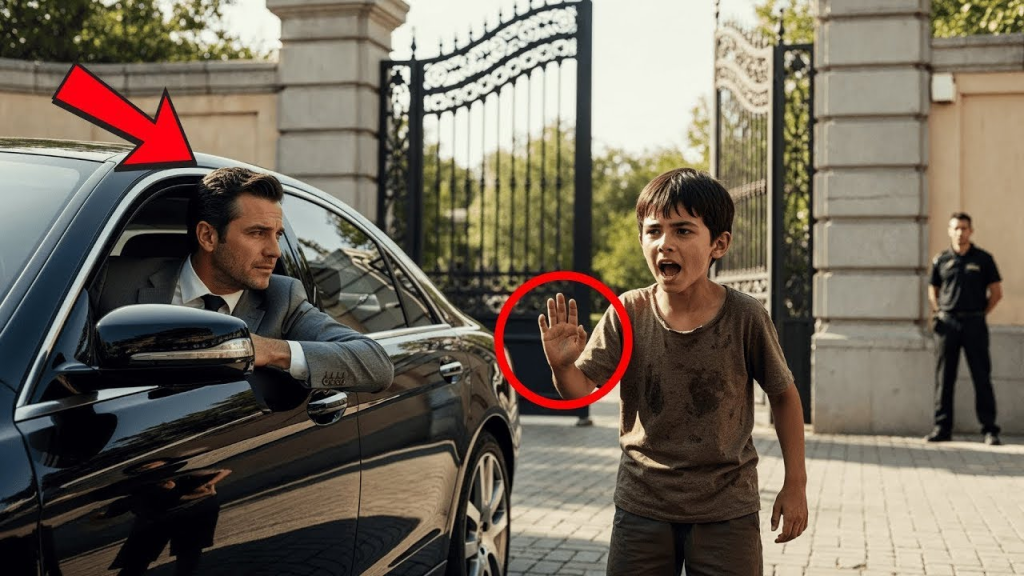
Salamanca district, Madrid. The automatic gate of the most exclusive mansion on Serrano Street opens on the black Mercedes S-Class of Carlos Mendoza, a real estate magnate worth €3 billion. A dirty, desperate boy throws himself in front of the car, shouting impossible warnings. Your wife has cut the brakes. There’s a deadly curve on the M30. You’ll die in 15 minutes. The millionaire laughs at the absurdity, but when the boy shouts that he’s his son, the son he abandoned 17 years ago, and calls Elena Rodríguez a ghost from his past, Carlos instinctively hits the brakes.
The pedal lowers without resistance. At that moment, he understands: the beggar is telling the truth, and he has only 30 seconds to decide whether to trust the son he’d never acknowledged or die at the hands of the wife he thought he knew. The morning of October 12th shone with that crystalline light that only Madrid can offer in autumn. Carlos Mendoza, 54 years of arrogance, condensed in a tailored suit from Ortega y Gasette Street, crossed the living room of his mansion in the Salamanca neighborhood with the confidence of someone who owns half the financial district.
His Italian shoes echoed on the Macael marble as he walked past the Goyas and Surbaranes, investments worth as much as entire blocks in Vallecas or Caravanchel. Isabel, his wife, stood on the glassed-in terrace, perfect in her champagne-colored silk robe, her ash-blond hair catching the morning sun. 48 years worn with the artificial elegance of someone who frequents the best clinics in the Moraleja district. She raised her hand in what seemed like an affectionate greeting as he headed toward the garage.
The kiss on the cheek they exchanged felt as hot as marble beneath their feet, a formality performed for the Filipino service and the security cameras. The black Mercedes S-Class was waiting, gleaming like polished obsidian, the latest jewel in a collection that included vintage Ferraris and Porsches never driven before. Carlos loved that morning ritual, the purr of the B8 engine, the scent of German leather, the feeling of absolute power as the automatic gates opened onto Madrid, which he dominated from his glass towers.
That’s when the boy appeared, materializing out of nowhere like a stain of dirty reality in the mansion’s perfect setting. 17, maybe 18 years old. His clothes told stories of nights under the bridges of the Manzanares, his hair tangled and greasy that hadn’t seen shampoo in weeks, but it was his eyes that struck, an intense blue that burned with feverish desperation in his face haggard from hunger. The boy literally threw himself in front of the Mercedes, his hands hitting the immaculate hood, leaving traces of grime. Carlos, he couldn’t know, the last intact thing he would see of his car.
His shout cut through the morning air with a primal urgency that made even the Ecuadorian gardener pruning the rosebushes turn around. Carlos rolled down the electric window with aristocratic annoyance, already mentally preparing to tell off the security chief for this unforgivable breach in the system. But the boy’s words froze him like liquid nitrogen in his veins. The young man was talking about brake cuts at a specific bend on the M30, at the Méndez Álvaro exit, after the tunnel, where the car would fly 50 meters until it crashed into the concrete wall.
He was talking about the bribed mechanic at the dealership, the driver who had gotten sick that very morning from a plan orchestrated to the last detail. Carlos Río, a deep, arrogant laugh, from someone accustomed to buying and selling human destinies as if they were land plots. But then the boy uttered the name that changed everything: Elena Rodríguez. Carlos’s blood turned to ice. Elena Rodríguez was a ghost buried 17 years ago under mountains of willful forgetfulness and dormant guilt.
The accountant from Móstoles with a first-class degree in business administration and eyes as blue as the Mediterranean, whom he had seduced out of boredom during a night of audits used for months as secret entertainment, then eliminated from her life when the pregnancy threatened to complicate their golden existence. The boy continued to speak, each word a nail in Carlos’s coffin. His name was Diego. He was the son Carlos had declared dead at birth, bribing the hospital’s head of gynecology, Gregorio Marañón.
Elena had committed suicide by jumping off the Segovia viaduct when he was four months old, after Carlos had her fired on false accusations of embezzlement, preventing her from finding work anywhere in Madrid with his network of influences. Carlos felt his hand instinctively move toward the brake pedal. He pressed it lightly, almost to verify the absurdity of those accusations. The pedal sank into the void like his certainties. Terror exploded in his chest like a bomb. He raised his eyes toward the terrace.
Isabel was still there with that perfect smile that now seemed like a black widow’s. Beside her, he noticed for the first time Joaquín, the head of security, smiling too. A knowing smile Carlos had seen a thousand times in the business world when someone was about to be stabbed in the back. The boy Diego, his son—the thought was impossible to process—urgently pointed to the black BMW parked 50 meters away. Roberto Sánchez, the notary who handled all of Carlos’s affairs, was at the wheel, his cell phone to his ear.
Isabel’s lover revealed, Diego, that he had been planning with her for three years up to this point. They had already prepared false documents, bought witnesses, and a reconstruction of the accident that would leave no doubt. A tragic fatality, an inconsolable widow who inherits everything. A new wedding after the obligatory mourning period. Carlos looked at this boy who claimed to be his son. He saw his own blue eyes in a face that had Elena’s delicate features. The same mouth, the same way she tilted her head. The genetic math was undeniable, but more than DNA, it was the look in her eyes that convinced him.
There was no hatred in those eyes, only a desperate urge to save the father he’d never had. The Mercedes’s engine purred. €300,000 of German engineering transformed into a death trap. Charles had seconds to decide. He could ignore the warning, drive toward the fate Isabel had prepared, die in the certainty of his convictions. Or he could believe this impossible savior who had emerged from nowhere, this phantom son who had chosen salvation over revenge. He turned off the engine.
The moment she got out of the car, she heard the metallic click under the Mercedes. Diego heard it too and dragged Carlos away with surprising force. The explosion that followed three seconds later transformed the Mercedes into a fireball that shattered the ground-floor windows. If she had remained in the car, there would have been nothing left to identify. Isabel screamed from the terrace, but it wasn’t a scream of fear for her almost-murdered husband. It was pure rage, frustration over a failed plan.
Joaquín was already pulling out his gun, but hesitated. Shooting in broad daylight in the Salamanca neighborhood with dozens of cameras and witnesses wasn’t planned. Roberto got out of the BMWB, his face a mask of panic as he frantically dialed numbers on his phone, probably calling accomplices for Plan B. Diego grabbed Carlos’s arm and ran not toward Serrano Street, where Roberto could intercept them, but toward Retiro Park, through a broken gate that only someone who lived on the street could have seen.
They ran through the centuries-old chestnut trees, while sirens and screams rose behind them. Carlos, accustomed to the gym with a personal trainer but not to actual escape, felt his lungs burn and his legs weaken. Diego, on the other hand, moved with the agility of an urban animal, knowing every path, every hiding place. They only stopped after 20 minutes, hidden in an abandoned municipal gardener’s shed. Carlos was panting, his tailored suit ruined, his Italian shoes scuffed and dirty. For the first time in decades, he had no control over anything.
He looked at this boy who claimed to be his son, who had just saved him from certain death, and saw Elena Rodriguez looking back at him through those blue eyes identical to his own. The shed stank of mold and neglect, cobwebs in the corners and rusty tools piled up like bones in a charnel house. Carlos Mendoza, the man who regularly lunched with ministers and bishops, sat on a rotten wooden box, while his son—the thought still seemed impossible—saw through the disjointed boards.
Diego told his story in a flat voice, without dramatic emphasis, like someone who has learned that emotion is a luxury the street doesn’t grant. He had grown up in the Sanil de Fonso orphanage until he was 11, when a dying nun revealed the truth about his birth and gave him the letter Elena had left. A letter that spoke of love for a man who had betrayed her, of hope that one day father and son would be reunited.
of forgiveness even in despair. Having escaped from the orphanage, he had lived on the streets of Madrid, sleeping under bridges in the summer and in subway stations in the winter. He had learned to survive by robbing tourists in the Plaza Mayor, sharing expired food behind Mercadonas with other invisible people in the city. But above all, he had spent years searching for Carlos Mendoza. Studying him like an entomologist studies a rare insect. He knew every property of Carlos, every habit, every secret whispered in the halls of power.
He knew about the dirty business dealings with the Romanian mafia for land in Getafe, the bribes paid to municipal officials for planning permits, the suicides caused by evictions during the crisis, but above all, for a year he had been living in the shadow of the mansion in the Salamanca district, sleeping in the dumpster in the park, observing the gilded life that unfolded behind the gate. That’s how he had discovered Isabel’s plan. The phone conversations in the garden.
Are you enjoying this story? Leave a like and subscribe to the channel. Now we continue with the video. When she thought she was alone, meeting with Roberto every Tuesday and Thursday, when Carlos thought they were at the spa and the manager, she had seen the cash pass through the hands of the dealership’s mechanic. She had heard Joaquín, the head of security, confirm his part in the plan. Carlos listened, feeling his world crumble brick by brick. Not only had they almost murdered him, but he had been betrayed by everyone he thought was his.
The woman who had slept in his bed for 20 years, the notary friend who managed his businesses, the head of security he paid handsomely—all actors in a comedy where he was the only one who didn’t know the script. Carlos’s cell phone vibrated. Messages from the banks. All accounts blocked for suspicious activity. Credit cards canceled, investment funds frozen. Isabel had moved quickly, using the powers of attorney he had signed for her over the years without reading them.
In a few minutes, he had gone from billionaire to destitute. Diego watched the father he’d never had as the magnitude of the disaster sank in. There was no satisfaction in his eyes, only a strange pity. He had saved this man not out of filial love. How can you love someone who has denied you existence, but out of a twisted sense of justice? Carlos deserved to know the truth before he lost everything. He deserved to see the face of the son he had erased. They remained in the shed until nightfall while the police outside combed the park.
But it wasn’t the real police. Diego knew that. They were Isabel’s men in uniform, bought off like everything else. When night fell, they moved through the invisible Madrid that Diego knew like the back of his hand: abandoned subway tunnels, passages between buildings that the homeless passed between them, routes that existed only for those who didn’t exist in the eyes of society. They arrived under the Vallecas bridge as the city slept. The community of invisibles who lived there greeted Diego with the familiarity of someone who shares the same sentence.
Carlos, in his tattered tailored suit, looked like an alien from another planet. They gave him cardboard to sleep on, an army blanket stolen who knows where, and a piece of stale bread that tasted like more. For the first time in 54 years, Carlos Mendoza slept on the bare earth, with the cold of the Manzanares penetrating his bones and the sound of rats scurrying in the darkness. Beside him, Diego slept peacefully, accustomed to it. On his other side, a university professor, reduced to alcoholism, recited his songs in his sleep, his head slumped, while an elderly prostitute coughed up blood in a corner.
The following days were a brutal education in survival. Diego guided Carlos through the depths of Madrid that tourists and the wealthy never saw. The soup kitchens of Caáritas, where former managers served soup to former workers, all leveled by the same misery. The makeshift shelters in abandoned stations, where hierarchies were based on violence, not bank accounts. The black markets for forged documents, expired food, and stolen medicines. Carlos learned to rummage through dumpsters at 5 a.m. before the garbage trucks came by.
He learned to distinguish edible food from poisonous food, Adorme R. With one eye open so as not to be robbed, to make himself invisible when patrol cars passed by. But above all, he learned to see the faces of those he had ruined. The woman who gave him a crust of bread in the cafeteria was an administrative assistant he had fired to cut costs. The man who showed him where to find clean water was a bricklayer who was left without severance pay when one of his companies strategically went bankrupt.
The boy who protected him from an attack was the son of a merchant who had committed suicide due to debts owed to the loan sharks Carlos used as unofficial debt collectors. Father Miguel, the street priest who ran a shelter in a deconsecrated church in Lavapiés, recognized him immediately. 70 years of wrinkles sculpted by social struggle, eyes that had seen too much to entertain illusions. He looked at him for a long time, then at Diego, then made a decision that surprised everyone.
He would help him, but on three conditions. Work in the dining room to atone, a public confession when the time was right, and Diego’s acknowledgment of his guilt, all that it entailed. Carlos agreed; he had no alternative, but above all, looking at Diego, who had saved him despite everything, he felt something he thought had died decades ago. Remorse, truly burning remorse for the lives destroyed, for Elena abandoned, for the son denied. Meanwhile, outside, the world kept turning. The newspapers reported on Carlos Mendoza’s kidnapping.
Isabel appeared on television, perfect tears rolling down her Botox, begging the kidnappers to return her husband. Roberto at her side, the concerned family friend. A performance that would deserve a Goya if it weren’t so tragically real. But Diego had an ace up his sleeve. During his years on the streets, he had met Javier—not the corrupt security chief, but another Javier, a 19-year-old hacker who made a living off computer scams. In exchange for protection from Latino gangs, Javier had begun tracking Isabel and Roberto’s every digital move.
He had everything: wire transfers to the Cayman Islands, WhatsApp chats about the murder plot, even the video of the mechanic cutting the brakes. Two weeks later, Isabel made her final move. She declared Carlos legally dead under emergency procedures, bribing judges and producing false testimony. Roberto became the estate administrator. The assets began to be sold at ridiculously low prices to shell companies with front men. The moment of truth came on November 15. Isabel had organized a press conference at the Cibeles Palace to announce the creation of the Carlos Mendoza Foundation, a front operation to launder the stolen money.
The entire Madrid elite would be present. Carlos walked through the front door, unrecognizable after weeks on the streets, his unkempt beard, Caritas clothes, but above all, his eyes were different. No longer the arrogance of a predator, but the conscience of a survivor. The silence was sepulchral when he took the microphone. The confession that followed went down in history. Not only did he reveal the attempted murder with evidence projected on the giant screen thanks to hacker Javier, but he confessed to all his crimes: names, dates, numbers, a total public self-destruction.
He announced that each property would be returned to the victims and that Diego, his finally acknowledged son, would manage the redistribution. Isabel was arrested on the spot. Roberto tried to flee, but was detained. The House of Naip collapsed in a few minutes. The Mendoza empire dissolved, but from its ashes something different began to rise. The trial was swift and ruthless. Isabel received 25 years. Roberto X. Carlos, for his total cooperation, received 5 years of community service. But the real punishment was living with what he had done, looking him in the eye.
Every day, father and son moved to a two-bedroom apartment in Vallecas, in the same building where Elena had lived. Carlos worked 18 hours a day between the Cáritas soup kitchen and Father Miguel’s construction projects. The hands that had signed multimillion-dollar contracts now cleaned toilets and kneaded cement. Diego resumed his night studies, making up for lost years with a voracious hunger for knowledge. At night, they ate dinner together, lentils with chorizo, talking about Elena, the past, and the future.
Slowly, painfully, they built something resembling a father-son relationship. A piece of land forgotten by Carlos turned out to contain Roman archaeological remains valued at 15 million. Diego, now the legal heir, didn’t hesitate. The Elena Rodríguez Center for Homeless Youth was born. 400 children found a home, an education, and hope. Carlos became the janitor, cleaning bathrooms with the same meticulousness with which he had previously signed multimillion-dollar deals. Five years later, Diego graduated with a degree in Economics from Complutense University, with honors like his mother.
Carlos sat in the front row, aged, but finally at peace. The Elena Rodríguez Center had become a national model, saving thousands of young people. Diego married Carmen, the daughter of a family Carlos had abandoned years before. The cycle of revenge transformed into a spiral of forgiveness. A daughter was born; they named her Elena. Carlos held her in his arms in the same hospital where Diego had been born, where the first Elena had died alone. This time would be different.
Ten years after the attempted murder, Carlos was still cleaning the school’s bathrooms by choice, as a form of meditation and penance. One morning, he found a new boy hiding and crying. A similar story: a rich father who had abandoned him, a suicidal mother. Carlos sat beside him on the freshly scrubbed floor and told his story. The boy looked at him in disbelief. Then he extended his hand. Carlos shook it. Another life saved, another circle closing only to reopen differently. Somewhere, in an afterlife Carlos had learned to believe in, Elena Rodríguez was smiling.
The monster who had loved had become human. The abandoned son had become a savior. Pain had transformed into redemption. It had all started with a beggar screaming in front of a golden gate. Sometimes salvation comes from where you least expect it. Sometimes children save the parents they never had. Sometimes, just sometimes, even monsters learn what it means to be human. The Elena Rodríguez Center continues to save lives. On the entrance wall, a plaque records the words Diego spoke to Carlos that first morning. Even monsters deserve to know the truth before they die, and sometimes, by learning the truth, they choose to truly live for the first time.
